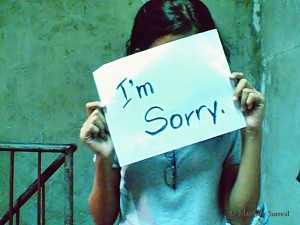Something remarkable happened today in Dallas, Texas that I feel compelled to share here as an example of a wellness practice that can benefit everyone.
It was done by a man in Texas whom I have never met, who heads an institution where I have never been, who said something publicly that I rarely hear.
The man is Mr. Barclay Berdan, CEO of Texas Health Resources.
The institution is Texas Health Presbyterian Hospital, where Ebola patient Mr. Thomas Eric Duncan was belatedly admitted after errors were made on the part of the hospital staff.
This is what Mr. Barclay said:
“For this, we are deeply sorry.”
Mr. Barclay apologized for the mistakes (he used that exact word) made by the Emergency Room staff in not communicating information regarding Mr. Thomas Eric Duncan’s travel history to West Africa, and in not correctly diagnosing his symptoms as Ebola. As I’m sure you all know Mr. Duncan subsequently died from the virus.
I read the whole letter of apology, which you can do here. Although I had read news articles regarding Mr. Barclay’s apology on behalf of Texas Health Resources, I wanted to read the original letter myself. It is notable for its compassion, its’ non-defensiveness and it’s specificity in delineating the mistakes committed by the hospital.
It is a true and genuine apology.
In my opinion, we see too little of the genuine apology in public (and private) discourse. I see many reasons for this. Some people confuse blame with responsibility, and understandably do not want to be blamed (or shamed) for their mistakes. We also live in a litigious society and fear what legal liabilities may befall us if we apologize. And some people see an apology as a sign of weakness that might invite retribution.
I believe a genuine apology is an essential wellness practice both for the person making the apology and the person receiving it. It is impossible to be human and avoid committing mistakes that hurt others. It is an inevitable part of the human condition. We all hurt others and are hurt by them. Thus we must find a way to deal with our hurtful natures: a way to take responsibility, to acknowledge our errors and regret for hurting another, to express our intent to do better and to be able to move forward in relationship with each other.
Hence, the apology.
An apology is a useful, healing and necessary wellness practice. Is there something you need to apologize for, something weighing on your conscience? Try apologizing. It may be the best thing you can do for yourself today.
Photo Credit: Leyram Odacrem via Flickr

